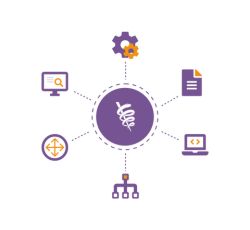Payment Posting in Medical Billing
Payment posting would be one of the most significant steps in any medical billing cycle so that healthcare providers will get paid for all their services provided. The process involves a record and maintenance of any kind of amount received by any insurance company, patients, or government programs like Medicare and Medicaid. Improved posted payments promote precise financial records and detection of underpayment and denials so that the entire revenue cycle for a healthcare practice is enhanced.
What is Payment Posting?
The posting of payments is essentially the putting away of payments into the accounting and billing system of a healthcare provider. It helps ensure that payments received from the insurance company, patients, or payers are properly captured in the books of accounts of the provider. The method of posting payments could be either manual or electronic based on what the provider has adopted. Effective posting of payments reduces some errors, cash flow, and efficient billing processes.
Importance of Payment Posting
1. Accurate Financial Books
Correct payment posting allows these healthcare providers to have an effective financial bookkeeping system without errors. Proper record-keeping allows the avoidance of any imbalances.
2. Detection of Payment Errors
Through payments posted, healthcare providers can find and focus on problems in the areas of underpayments, denial of payments, or delayed payments to take further suitable corrective measures.
3. Effective Claim Reconciliation
Payment posting helps providers match payments with submitted claims, thereby ensuring that every billed service has been properly paid.
4. Errors in Billing reduction
In case of errors in payment, the provider can correct errors immediately to prevent loss of revenue. Analysis of certain patterns related to denials or delayed payments will help improve billing efficiency.
5. Better Patient Account Management
Accurate posting of payments will enable proper updating of patient balances. This, therefore, will allow easy billing statement provision.
6. Better Revenue Cycle Management
Accurate payment posting allows for the tracking of income and trend analysis in revenues, which provides better financial decisions.
Best Practices for Payment Posting
1. Electronic Payment Posting
Change from manual payment posting to electronic payment posting, which reduces the number of errors and increases efficiency. Electronic remittance advice (ERA) received from insurance companies automatically posts payments into the system, thus eliminating the need for manual data entry. This increases the speed, reduces errors, and ensures accuracy in payment records.
2. ERAs and EOBs Review
EOBs and ERAs detail payment information, adjustments, and denials. Their routine check will also result in payments that are accurately posted, ensuring errors such as claims that did not arrive or are underpaid, are picked and corrected before much time lapses.
3. Verify adjustments and write-off
Adjustments and write-offs often occur in the medical billing industry, but should not be made unless reviewed and authorized. Some insurers apply reduction amounts to payments with no apparent rationale. Providers need to ensure all adjustments are entered and authorized accurately to avoid a loss of revenue.
4. Monitor Underpayments and Denials
Sometimes, insurance companies do not pay the full expected amount for a service. Monitoring underpayments allows healthcare providers to take corrective actions, such as filing appeals or requesting payment reconsiderations. Tracking denied claims is equally important, as it helps identify common issues and improves future claim submissions.
5. Reconcile Payments with Bank Statements
Regular reconciliation of posted payments with bank statements ensures that all received payments match the posted records. In case of any discrepancy, this should be looked into and corrected right away to maintain accurate financial records.
6. Train Billing Staff
Knowledge and experience of the billing staff determine the efficiency of payment posting. Training sessions help the staff to be updated on the latest coding, billing, and insurance policies. A well-trained staff is less likely to make posting errors, hence improving overall efficiency and accuracy.
7. Establish a Strong Denial Management Process
Denials due to claims occur frequently in medical billing, but do not let these be overlooked. A well-planned denial management process will ensure that the claims denied are captured, corrected, and resubmitted for pay as soon as possible. Thus, it results in revenue recoveries and improving cash flow.
Challenges in Payment Posting
1. Complex Insurance Policies
Every insurance firm has its rules concerning payment processing, adjustments, and denial. Maintaining track of these policies, as well as changes to the policies, may be tedious and difficult for the healthcare provider.
2. Manual Error
Payment posting would involve the processing of large quantities of data, while manual entry involves the risk of error. Discrepancies in payment postings, adjustments, or denials tend to cause more problems in reconciling financial positions and billing-related issues that cost extra effort for correction.
3. Delayed Payments
Insurance companies usually take time to process claims and make payments. Such delays may disrupt cash flow and affect the financial stability of healthcare providers, which makes it hard to cover operational expenses.
4. Underpayments and Unexplained Adjustments
Sometimes, insurance companies pay less than expected for a service without giving clear explanations. Finding and correcting such underpayments requires follow-up and, in some cases, an appeal for proper reimbursement.
5. Multiple Payers
Health care providers have multiple payers including private insurance companies, government programs like Medicare and Medicaid, and direct patient payments. Paying the multiple payers needs to be reconciled with an accurate account in order to get a report that will make reconciliation easy.
_11zon_11zon.png_1743081147.png)
How Meru Accounting Help with Payment Posting
1. Electronic Payment Posting
Meru Accounting has automated electronic payment posting systems to avoid errors and reduce the manual input load. Payments are posted promptly and accurately, without loss of much time or undue administrative burden.
2. Claims Reconciliation
Our team examines each payment and compares it with the claims submitted for reconciling. If a discrepancy exists, we research and settle such discrepancies so that health providers will be reimbursed properly for their services.
3. Denial Management
Meru Accounting keeps track of all denied claims and identifies the cause of denial to help providers re-submit the corrected claims. The structured denial management process assists in reducing revenue losses and increases claim approval rates.
4. Revenue Tracking and Analysis
Meru Accounting gives a detailed report of revenue trends, payment collections, and outstanding claims. Such reports help healthcare providers make better financial decisions and enhance their billing process.
5. Compliance and Accuracy Checks
Our team ensures that all payments are posted correctly, adjustments are properly documented, and records comply with industry regulations. This reduces compliance risks and helps maintain accurate financial records.
Conclusion
Providers can improve efficiency and lessen errors by making use of some best practices, for example, the use of electronic posting of payments, tracking denials, reconciliations of payments, and even training staff. Due to insurance complexities and underpayments, reimbursements get delayed and payment posting becomes harder.
Partnering with experts like Meru Accounting helps in the simplification of payment posting and consequently improves revenue cycle management and a stable financial position. Smooth payment posting can help healthcare providers focus more on quality patient care while their financial system remains healthy.
Our Bookkeeping And Writeup Process

Your Need
Search the Service You need

Enquiry
For enquiring make a call or mail us

Confirm
Get your Quote and confirm us

Stay Calm
Feel free and Relax Yourself

Effective budgeting and forecasting are crucial elements of strategic financial management, offering a structured pathway to business success.
Read MoreStarting a new business is exciting and it’s full of opportunities and challenges. At Meru Accounting, we understand the complexity involved and we provide comprehensive Business Start-Up ...
Read MoreCost control and reduction strategies are important elements of any organization's financial management structure. In the competitive marketplace, businesses must precisely manage their expe...
Read More
Due diligence services refer to a set of investigative procedures and assessments conducted by professionals, typically in accounting, finance, law, or consulting fields, to evaluate a business,...
Read More
Risk management is a crucial process employed by organizations to identify, assess, and prioritize potential risks that could hinder their objectives.
Read More
Business Process Optimization (BPO) is a strategic approach aimed at enhancing efficiency, reducing costs, and improving overall performance within organizations.
Read More
Financial restructuring is a strategic process that involves reorganizing a company’s financial framework to improve its stability and performance.
Read More
Although launching a business is an exciting endeavour, there are risks and difficulties associated with it. Effective financial management is essential to the success of every start-up, and it ...
Read More
Performance and improvement consulting is pivotal for businesses seeking to optimize operations and achieve sustainable growth.
Read More
Forensic accounting is a specialized area of accounting that involves investigation of financial records to detect fraud, theft, or other financial crimes.
Read More
Software implementation is a vital phase in the lifecycle of any software application. It involves a series of steps designed to ensure that the software is correctly installed and configured to...
Read More
Project accounting is a specialized branch of accounting that focuses on tracking and managing the financial aspects of a specific project throughout its lifecycle.
Read More
In the modern business environment, companies are increasingly recognizing the importance of nurturing not just the professional growth but also the financial well-being of their employees.
Read More
Handling accounts payable is an essential part of managing a business’s finances. It involves tracking and paying invoices, maintaining good vendor relationships, and ensuring cash flow re...
Read More
Medical billing plays a very central role in the healthcare area.
Read More
Patient registration is the first and the most important when a person steps into a hospital, clinic, or any medical facility.
Read More
Insurance verification is among the most integral steps in medical billing. Before providing even a single health service,
Read More
Medical coding refers to the procedure of converting diagnoses, procedures, medical service, and other forms of medical equipment into...
Read More
Claim submission is one of the key processes in health care because this ensures that service providers get remunerated on time.
Read More
Payment posting would be one of the most significant steps in any medical billing cycle so that healthcare providers will get paid for...
Read More
Denial management is one of the important processes in medical billing because it makes sure that the providers of health services...
Read More
Reporting and analytics are crucial parts of medical billing. They will help healthcare providers follow up on the financial performan...
Read More

